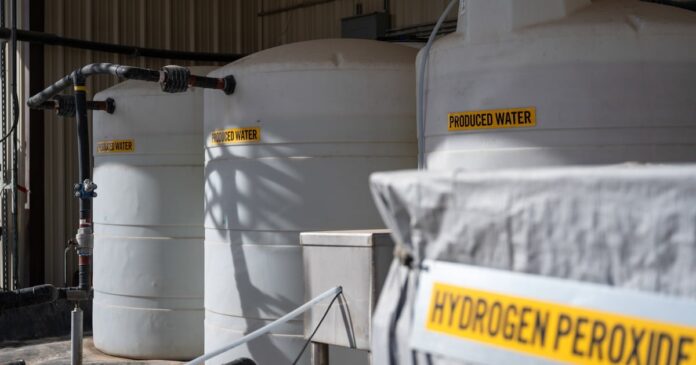Subscribe to The Y’all — a weekly dispatch about the people, places and policies defining Texas, produced by Texas Tribune journalists living in communities across the state.
ODESSA — Oil and gas companies are seeking legal shelter as Texas comes closer to using waste brine once considered too toxic for anything other than fracking to replenish Texas’ water shortages.
Legislation filed by state Rep. Drew Darby, R-San Angelo, could give them, transportation companies and landowners such protection.
Darby told a Texas House panel in March his bill will give industries the certainty they need to ramp up treatment of the industrial waste, known as produced water. The full House approved the legislation earlier this year and it is awaiting a Senate debate.
Gov. Greg Abbott and other Republican leaders have made water a priority issue this session. Several proposals aim to increase the state’s water supply, which is under duress from a growing population, climate change and leaking infrastructure. Cleaning produced water is one of several ways lawmakers hope to boost supply.
There is an extraordinary amount of backwash from oil production, which continues to break records, especially in West Texas. For every barrel of oil produced, as many as five barrels of water are captured, Darby told lawmakers on the committee on natural resources, where he introduced the bill.
That water is either reused for fracking or stored underground.
However, industry and legislators have put millions of dollars toward researching treatment methods.
And now, some companies say they have scrubbed out the toxic contaminants to help refill drying bodies of water in West Texas. But the oil and gas industry is hesitating to expand this effort unless it can be sure it is shielded from liability after it hands off the water.
If legislators fail to assure the industry, companies might not want to treat the water and sell it, said Michael Lozano, who leads government affairs at the Permian Basin Petroleum Association.
“Without developing this field with legal certainty, Texas will miss out on millions of barrels of day of treated produced water that could benefit industrial and land application of water uses, which could continue to decrease reliance on fresh water in these sectors,” Lozano said.
Darby’s bill, House Bill 49, says that after an oil company agrees to sell the water for beneficial use by someone else, it is generally not liable if there are consequences later on. Neither are the companies treating the water. The bill also protects landowners who pay to treat the water and sell it, including in cases of personal injury, death, or property damage.
Companies can be liable in some cases, including gross negligence, intentional, wrongful acts of omission, breaking state and federal treatment laws, or failing to meet standards under the Texas Commission on Environmental Quality, the state’s environmental regulator.
It also directs the commission to write more rules outlining how the water should be treated and used.
In a statement to The Texas Tribune, Darby called liability a “key barrier” to expanding produced water treatment, adding the bill “does not shield bad actors — anyone who violates the law or their permit remains fully liable.”
It’s unclear when the state might begin allowing treated produced water into nature. Four treatment companies have applied for permits with the Texas Commission on Environmental Quality to discharge or dispose of produced water into the state’s bodies of water.
Darby’s proposal has set off alarms among environmental policy experts who say that regulators authorizing companies to discharge produced water are not working with enough data to support their decisions.
The commission, which oversees all discharges, including those from oil and gas, has said the agency follows state and federal guidelines. Regulators are also gathering information supplied by the Texas Produced Water Consortium, a research initiative consisting of five pilot projects established by lawmakers in 2021 to study treatment methods of produced water.
The amount of chemicals in produced water varies by sample. Some estimates have detected hundreds, establishing the liquid as one of the most complicated to treat.
Nichole Saunders, senior attorney at the Environmental Defense Fund, said she does not trust the permits to account for every chemical and toxic contaminant. She said the water could still contain dangerous contaminants that the permit does not account for. Regulators and scientists should continue to improve testing before issuing permits, she said.
“We’re basing the responsibility for outcomes on the safety net of our regulatory system with this bill,” she said. “Not on what outcomes might be possible in a best-case scenario.”
Dan Mueller, an engineer and a produced water expert, agreed that there is not enough data to issue permits. Mueller raised concerns about the capability of the treatment technologies, saying the five pilot projects have not been running long enough to ensure they clean the water reliably.
And if the treated water causes environmental or human harm, he said, there are no assurances that the companies that discharge the water can afford to remediate all issues. He says the bill and permits should include financial mechanisms that can cover environmental problems, should they occur.
Without these assurances, “the responsibility to clean up any contamination that might occur is going to fall to the state, and ultimately that falls to the taxpayer, who will have to foot the bill,” he said. “That’s just not right.”
Lozano, with the industry trade group, said there are no existing protections for oil and gas companies that treat and sell the water, adding that treatment gives them another alternative for the excess.
“If this segment of the industry cannot develop and mature, it could impact the record production that has occurred in the Permian Basin,” he said.
Disclosure: Environmental Defense Fund and Permian Basin Petroleum Association have been financial supporters of The Texas Tribune, a nonprofit, nonpartisan news organization that is funded in part by donations from members, foundations and corporate sponsors. Financial supporters play no role in the Tribune’s journalism. Find a complete list of them here.
First round of TribFest speakers announced! Pulitzer Prize-winning columnist Maureen Dowd; U.S. Rep. Tony Gonzales, R-San Antonio; Fort Worth Mayor Mattie Parker; U.S. Sen. Adam Schiff, D-California; and U.S. Rep. Jasmine Crockett, D-Dallas are taking the stage Nov. 13–15 in Austin. Get your tickets today!







